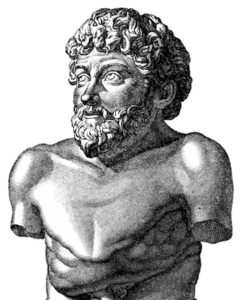
Aesop (likeness)
On this day, 620 BC, the birth of Aesop, an ancient Black storyteller, is celebrated. He is known for his stories, called "Aesop's Fables," which have become a blanket term for collections of brief fables, usually involving anthropomorphic animals.
Aesop was a Black slave of Iadmon, located in the south of Greece near northern Africa. Most accounts describe Aesop as a deformed man whose name came from the Greek word Aethiops, Ethiopia.
According to Herodotus, he lived in Samos in the 6th century BC and was eventually freed by his master in Iadmon. Other accounts connect him with wild adventures and associate him with rulers such as Solon and Croesus.
The first extensive translation of Aesop into Latin was done by Phaedrus, a freedman of Augustus, in the first century AD. William Caxton published the first printed version of Aesop's Fables in English on March 26, 1484. William Dugard translated his stories from the Greek text of Planudes in 1715. He also describes Aesop as one whom "Nature had gratified with an ingenious mind, but the Law had enslaved." Physically, he had a large head, bowed legs, and a large belly.
During Peisistratus's reign, Aesop visited Athens and told the fable "The Frogs Asking for a King." He told the story to deter the citizens from attempting to replace Peisistratus with another ruler.
According to historical legends, he prospered most around 550 BC and was killed around 560 BC, ordered by a decree of the Delphic oracle. It has also been said that the grandson of his master claimed compensation for his death.
His fables are some of the most well-known in the world and remain a choice for the moral education of 21st-century children. Many stories included in Aesop's Fables, such as "The Fox and the Grapes" (from which the idiom "sour grapes" was derived), "The Tortoise and the Hare," "The North Wind and the Sun," and "The Boy Who Cried Wolf," are well-known throughout the world. A few famous quotations by Aesop are; "After all is said and done, more is said than done." "Any excuse will serve a tyrant." "United we stand, divided we fall." "Be content with your lot; one cannot be first in everything."
1001 things everyone should know about African American History
by Jeffery C. Stewart,
Copyright 1996, Doubleday
ISBN 0-385-47309-5